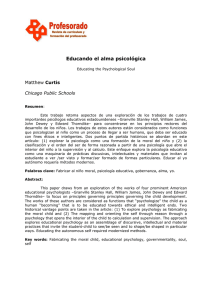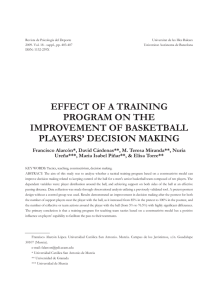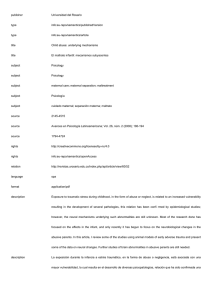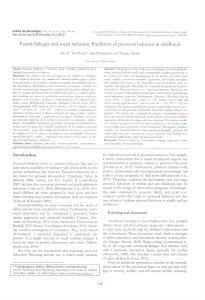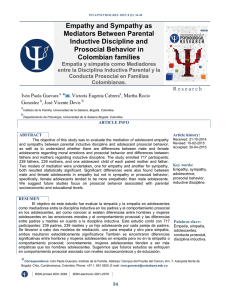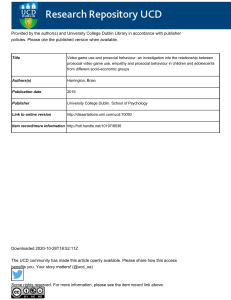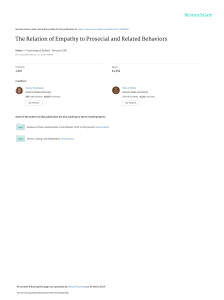Course Guide - Universitat de València
Anuncio
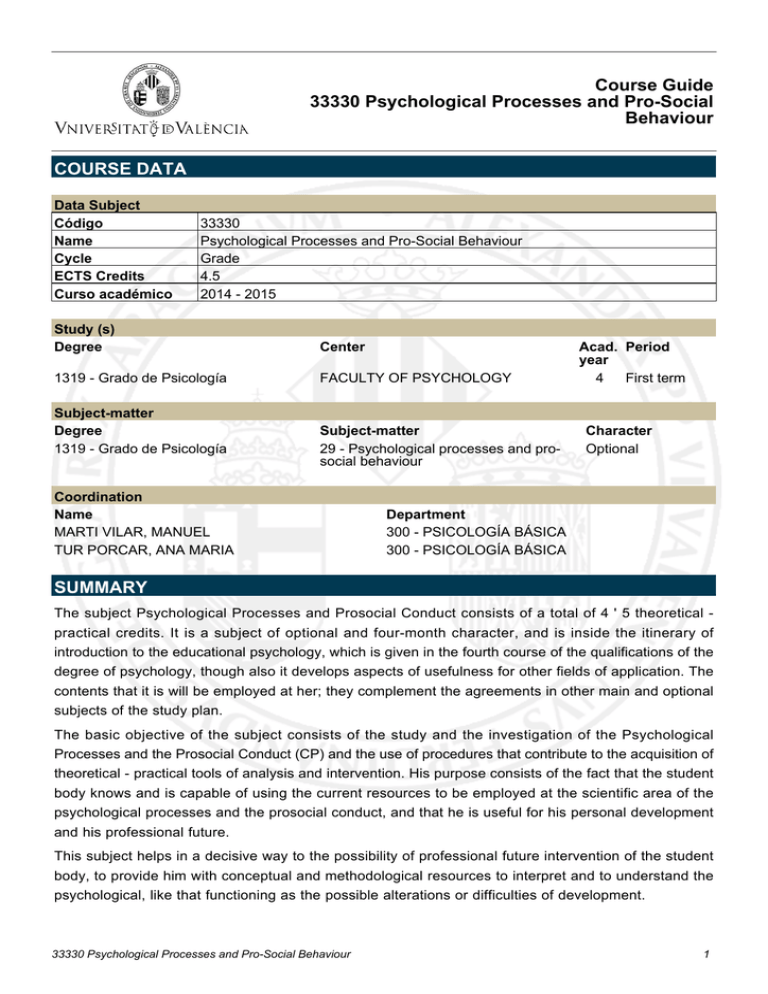
Course Guide 33330 Psychological Processes and Pro-Social Behaviour COURSE DATA Data Subject Código Name Cycle ECTS Credits Curso académico 33330 Psychological Processes and Pro-Social Behaviour Grade 4.5 2014 - 2015 Study (s) Degree Center 1319 - Grado de Psicología FACULTY OF PSYCHOLOGY Subject-matter Degree 1319 - Grado de Psicología Subject-matter 29 - Psychological processes and prosocial behaviour Coordination Name MARTI VILAR, MANUEL TUR PORCAR, ANA MARIA Acad. Period year 4 First term Character Optional Department 300 - PSICOLOGÍA BÁSICA 300 - PSICOLOGÍA BÁSICA SUMMARY The subject Psychological Processes and Prosocial Conduct consists of a total of 4 ' 5 theoretical practical credits. It is a subject of optional and four-month character, and is inside the itinerary of introduction to the educational psychology, which is given in the fourth course of the qualifications of the degree of psychology, though also it develops aspects of usefulness for other fields of application. The contents that it is will be employed at her; they complement the agreements in other main and optional subjects of the study plan. The basic objective of the subject consists of the study and the investigation of the Psychological Processes and the Prosocial Conduct (CP) and the use of procedures that contribute to the acquisition of theoretical - practical tools of analysis and intervention. His purpose consists of the fact that the student body knows and is capable of using the current resources to be employed at the scientific area of the psychological processes and the prosocial conduct, and that he is useful for his personal development and his professional future. This subject helps in a decisive way to the possibility of professional future intervention of the student body, to provide him with conceptual and methodological resources to interpret and to understand the psychological, like that functioning as the possible alterations or difficulties of development. 33330 Psychological Processes and Pro-Social Behaviour 1 Course Guide 33330 Psychological Processes and Pro-Social Behaviour Across the theoretical and practical program, a tour is realized by the principal theoretical and methodological cores that along the history have shaped the investigation of the prosociality. The thematic and practical development contributes the principal contributions of the psychology to the investigation of the psychological processes and the prosocial conduct, to bring near to the student body to the areas of prevention of the prosocial conduct and to learn to intervene in the educational area of the prosociality, this way like to incorporate the general perspective of the current psychology, as science of the health, in relation specially into favouring activities as the sport and the exercise. PREVIOUS KNOWLEDGE Relationship to other subjects of the same degree There are no specified enrollment restrictions with other subjects of the curriculum. Other requirements Since this course is part of the core major subjects of the academic studies in psychology, it does not need of any preliminary requirement. However, this guidebook was developed taking into account the University of Valencia curricula as well as the students previous knowledge on psychological processes such other courses on Basic and Educational Psychology, biological bases, psychosocial variables and methodology. Therefore, it is convenient that students have surpassed at least those credits related to OUTCOMES 1319 - Grado de Psicología - LEARNING OUTCOMES 1. To specify the basic characteristics related to the Prosocial behavior and to define of what it consists. 2. To identify the factors that influences the Prosocial behavior from the bio- psico-social perspective. 3. To explain the evolutionary origin of the Prosocial Conduct, so much from the filogenética as ontogenétical perspective. 4. To apply the knowledge on the Prosocial Conduct to different tasks and situations 5. To develop a critical thought, from the study of the Prosocial behavior (CP) 6. To know and to know how to apply preventive strategies and of intervention for the education of the CP in the area of the sport and the physical exercise. 33330 Psychological Processes and Pro-Social Behaviour 2 Course Guide 33330 Psychological Processes and Pro-Social Behaviour DESCRIPTION OF CONTENTS 1. BASIC ASPECTS. Introduction, basic Concepts and Methodology. Psychological basic processes. Relation between the cognitive, affective and motivational processes, and the Prosocial Behavior. Some key concepts. Thought and ethical conduct. Motivation, Emotion and Prosocial Behavior. Epistemological and methodological basis. Diachronic and synchrony of the moral Psychology. 2. PROSOCIAL BEHAVIOR -Theoretical Models explanatory of the Prosocial behavior. Approximations to the development of the Social Positive Behaviors. Models who explain the prosociality. Other models. -Determinant factors of the Prosocial Behavior Sociodemographics, cognitive, affective and personality variables. Factors of the context of socialization and situational. 3. INSTRUMENTAL ASPECTS IN THE EVALUATION OF THE PROSOCIAL BEHAVIOR. Instruments of evaluation of the principal psychological Processes and the Prosocial Behavior. The psychological evaluation of the ethical thought, the motivation and the empathy. Instruments for the measure of the moral thought, the empathy and the Prosocial Behavior. 4. INTERVENTION IN THE PROSOCIAL BEHAVIOR. -Intervention in the Prosocial Behavior: Development, areas and optimization. The prosocial conduct along the Vital Cycle, legal environment and the intervention in primary and secondary educational level. Design of programs of intervention in the area of the prosocial behavior. -Challenges of the moral Psicoeducation. The values: Foundations of the moral psicoeducation, The Social Responsibility. 5. PSYCHOLOGICAL PROCESSES AND PROSOCIAL EHAVIOR IN THE SPORT AND PHYSICAL ACTIVITY. 33330 Psychological Processes and Pro-Social Behaviour 3 Course Guide 33330 Psychological Processes and Pro-Social Behaviour -Introduction to the area. Historical and professional development. The prosocial conduct is developed in the frame of the physical - sports activity, which includes the game, as a basic tool in a field of application with historical tradition and important professional impact. -Learning and development of the prosocial behavior and the health: motivational approach. Relevant paper of the motivational processes of in the learning of the prosocial behavior, his beginning, development and potential risks. -Factors facilitators and inhibiting of the prosocial behavior: direction and intensity. The prosocial behavior can turn facilitated or impeded depending on since it focuses and since it is experienced, that is to say, in relation by the establishment of you them put and the emotions that link themselves with his activation. 6. EDUCATION OF THE PROSOCIAL BEHAVIOR FOR THE CONVIVENCE AND HEALH IN SPECIFIC POPULATIONS -Education of the prosocial conduct, well-being and health. The prosocial behavior is a basic element for a healthy conviviality, so much from a personal as collective point of view, and so much from a perspective of the present as of the future development. -Specific populations with educational needs of personal nature: challenges and determining. It is a fundamental resource to know the possibilities of use of the physical - sports activity for the development of the prosocial behavior, in such aspects as the change of attitudes, values and sportsmanship. Is outlined the paper of the familiar environment in this context. -specific Populations with educational needs of social nature: challenges and determining. The education of the prosocial conduct links itself with the generation of well-being and health in this area, though it is necessary to foresee and intervene - in his case - from the psychological knowledge, before the potential risks as the aggression and other inadequate and insane behaviors (doping, vigorexia...). WORKLOAD ACTIVITY Theoretical and practical classes Attendance at events and external activities Development of group work Development of individual work Study and independent work Readings supplementary material Preparation of evaluation activities Preparing lectures Preparation of practical classes and problem TOTAL 33330 Psychological Processes and Pro-Social Behaviour Hours 45,00 3,00 5,00 7,00 15,50 3,00 4,00 15,00 15,00 112,50 % To be attended 100 0 0 0 0 0 0 0 0 4 Course Guide 33330 Psychological Processes and Pro-Social Behaviour TEACHING METHODOLOGY In order to enhance the learning of significant knowledge and the development of related skills among students, active and participative didactic methods will be displayed through the following: Lectures and presentations on the subject contents (1) Practical activities (case studies, forums and texts analysis) (2) Tutoring (3) Students independent academic work, report writing, etc. both in individual or group settings Formative and summative evaluation. EVALUATION MINIMUM REQUIREMENTS: -Passing the final exam -Writing a comprehensive report -Attending at least to 70% of class activities. EXAM The exam will consist on a close-ended multiple choice test as requested by the Institution official call - The exam will include all contents covered both in class activities (attending required) and not obligatory class attending activities - The exam will be worth 70% of the final score REPORTS - A comprehensive report (either individual or group) on the subject matter instructed by the teacher will be mandatory. - This report will be worth 20% of the final score. ACTIVITIES ALONG THE COURSE - Along with the regular lectures, there will be other activities (e.g. exercises, reviews, comments, reports, content related questions, etc.) - Delivery and participation of all class activities will have a maximum score of 1 point (10% of the final score). 33330 Psychological Processes and Pro-Social Behaviour 5 Course Guide 33330 Psychological Processes and Pro-Social Behaviour REFERENCES Basic - Cantón, E. (2002). Deporte, salud, bienestar y calidad de vida. Cuadernos de Psicología del Deporte, Vol. 1(1), 27-38. Cantón, E. et al. (1995). Motivación en la actividad física y el deporte. En L. Mayor y F. Tortosa (Eds.): Ámbitos de aplicación de la Psicología motivacional. Bilbao: Desclée de Brouwer (DDB) - 2ª ed. RevisadaCantón, E. y Checa, I. (2012). Los estados emocionales y su relación con las atribuciones y las expectativas de autoeficacia en el deporte. Revista de Psicología del Deporte, 21 (1), 171-176. Cantón, E. y León, E. (2005). La resolución de conflictos en la práctica deportiva escolar. Cuadernos de Psicología del Deporte, 5 (1 y 2), 153-166. López, F; Fuentes, M.J.; Ortiz, M.J., y Etxebarria, I. (1999). Cómo promover la conducta prosocial y altruista. En E. Pérez y M. V. Mestre. Psicologíamorla y Crecimiento Personal. Barcelona: Ariel. Llinares, L.I.; Córdoba, A.I.; Martí-Vilar, M.; García, J.; Casino, A. (2013). ¿Conocemos a nuestros estudiantes? Las Creencias epistemológicas y el sistema de valores en el EEES. @tic.revista dinnovació educativa, 10, 24-32 Martí, J.J. y Martí-Vilar, M. (2013). Una década de responsabilidad social universitaria e Iberoamérica. Revista Española del Tercer Sector, 25, 145-161. Martí Vilar, M. (2010). Razonamiento moral y prosocialidad. Fundamentos. Introducción. Madrid: CCS. ; Cap. 2:, 4, 5, 6, 7, 8, 10, 11 i 12. - Martí-Vilar, M.; Martí, J.J. (2012). Bases teóricas de la prosocilidad. En Educación para la Responsabilidad Social: Estrategias de Enseñanza y evaluación. (pp 10-25). Concepción: Universidad de Concepción. Mestre, M. V., Frías, M. D., Samper, P. y Tur, A. (2002). Adaptación y validación en población española del PROM: Una medida objetiva del razonamiento moral prosocial. Acción Psicológica, 1, 221-232. Mestre, V., Latorre, A., Tur, A. M., Samper, P. y Cortés, M. T. (2010). Prosocialidad y Empatía como procesos de integración social y cultural. Un programa de educación intercultural. Conselleria dEducació. Generalitat Valenciana. Mestre, M.V.; Tur, A.M.; Samper, P.; Nácher, M.J. y Cortés, M.T. (2006). Estilos de crianza y Conducta prosocial. En S. Bonino y G.V. Caprara (Eds.). Conducta prosocial en el niño y en el adolescente (pp.135-156). Gardolo.Erickson. Pelegrín, A., Garcés de los Fayos, E. y Cantón, E. (2010). Estudio de conductas prosociales y antisociales. Comparación entre niños y adolescentes que practican y no practican deporte. Informació Psicològica, 99, 64-78. Additional 33330 Psychological Processes and Pro-Social Behaviour 6 Course Guide 33330 Psychological Processes and Pro-Social Behaviour - Referencia c1:Cantón, E. (2010). Un caso paradigmático de la encrucijada actual en Psicología del Deporte: el trabajo e investigación en motivación. Revista dInformació Psicològica, 100, 24-36. Referencia c2:Cantón, E. Leon, E. y Hernansai, B. (2004). Favorecimiento de la motivación prosocial en la Educación Primaria a través del deporte. En A.M.E. (Ed.): Motivos, emociones y procesos representacionales: de la teoría a la práctica (pp. 119-125). Valencia: Fundación UniversidadEmpresa de Valencia (ADEIT). Referencia c3:Cantón, E. y Checa, I. (2010). La Psicología del Deporte y la Psicología de la Salud: dos campos profesionales y un objetivo común. Apuntes de Psicología, 28 (2), 307-314. Referencia c4:Cantón, E. y Checa, I. (2011). El consumo de esteroides y su relación con variables psicológicas en practicantes de musculación. Health and Addictions / Salud y Drogas, 11 (2), 129143 Referencia c5:Cantón, E., Mayor, L. y Cano, L. (1991). Adicción y deporte: perspectiva psicológica del fenómeno del doping. Revista de Serveis Socials, 15-16, 57-60. Referencia c6:Martí Vilar, M. (2008). Las necesidades humanas desde la psicología moral. Papeles de relaciones sociales y cambio global, 102, 89-101 Referencia c7:Martí Vilar, M. Pensamiento Sociomoral y Conducta prosocial (2010/2011). En B. Gargallo y P. García. El Open Course Ware de la Universitat de Valènica 2010. Espai Obert de Ceneixement. Vol. II. València. Servei de Publicacions de la Universitat de València - Referencia c8:Martí Noguera, J.J. y Martí-Vilar, M. (2013). Una década de Responsabilidad Social en Iberamérica. Revista Española del Tercer Sector, 25, 145-161 Referencia c9:Martí Vilar, M. y Palma, J. (2009). Influencia del sexe i ledat en el Raonament Moral prosocial dels estudiants de secundària. Anuari de Psicologia de la Societat Valenciana de Psicologia, 12 (1-2), 65-85 Referencia c10:Martí Vilar, M. y Palma, J. (2010). Jerarquización y preferencia de valores en estudiantes de secundaria. Revista Española de Orientación y Psicopedagogía, 21, 2, 3er Cuatrimestre. Referencia c11:Martí Vilar, M. y Palma, J. (2011). Diferencies de sexe i edat en la disposició empàtica dels estudiants de secundària. Anuari de Psicologia de la Societat Valenciana de Psicologia, 13 (1-2), 255-270 Referencia c12:Martí, J.J.; Martínez, F.A. y Martí Vilar, M (2011). Constitució duna comunitat social dinvestigació amb persones majors des de la responsabilitat social universitaria. Anuari de Psicologia de la Societat Valenciana de Psicologia, 13 (1), 61-79 Referencia c13:Sánchez-Gombau, M.C. y Cantón, E. (2001). La práctica de actividad físico-deportiva de riesgo como herramienta preventiva de conductas desajustadas. Revista de Psicología del Deporte, 10 (2), 225-236 Referencia c14::Weinberg, R. y Gould, D. (1996). Fundamentos de Psicología del deporte y el ejercicio físico. Barcelona: Ariel. 33330 Psychological Processes and Pro-Social Behaviour 7
